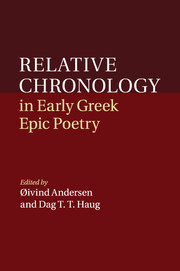Book contents
- Frontmatter
- Contents
- Notes on contributors
- Preface
- Abbreviations
- Introduction
- Chapter 1 πρῶτόν τε καὶ ὕστατον αἰὲν ἀείδειν
- Chapter 2 Relative chronology and an ‘Aeolic phase’ of epic
- Chapter 3 The other view
- Chapter 4 Late features in the speeches of the Iliad
- Chapter 5 Tmesis in the epic tradition
- Chapter 6 The Doloneia revisited
- Chapter 7 Odyssean stratigraphy
- Chapter 8 Older heroes and earlier poems
- Chapter 9 The Catalogue of Women within the Greek epic tradition
- Chapter 10 Intertextuality without text in early Greek epic
- Chapter 11 Perspectives on neoanalysis from the archaic hymns to Demeter
- Chapter 12 The relative chronology of the Homeric Catalogue of Ships and of the lists of heroes and cities within the Catalogue
- Chapter 13 Towards a chronology of early Greek epic
- Bibliography
- General index
- Index locorum
Chapter 4 - Late features in the speeches of the Iliad
Published online by Cambridge University Press: 05 January 2012
- Frontmatter
- Contents
- Notes on contributors
- Preface
- Abbreviations
- Introduction
- Chapter 1 πρῶτόν τε καὶ ὕστατον αἰὲν ἀείδειν
- Chapter 2 Relative chronology and an ‘Aeolic phase’ of epic
- Chapter 3 The other view
- Chapter 4 Late features in the speeches of the Iliad
- Chapter 5 Tmesis in the epic tradition
- Chapter 6 The Doloneia revisited
- Chapter 7 Odyssean stratigraphy
- Chapter 8 Older heroes and earlier poems
- Chapter 9 The Catalogue of Women within the Greek epic tradition
- Chapter 10 Intertextuality without text in early Greek epic
- Chapter 11 Perspectives on neoanalysis from the archaic hymns to Demeter
- Chapter 12 The relative chronology of the Homeric Catalogue of Ships and of the lists of heroes and cities within the Catalogue
- Chapter 13 Towards a chronology of early Greek epic
- Bibliography
- General index
- Index locorum
Summary
In the Preface to the second edition of his Studies in the Language of Homer, G. P. Shipp wrote:
That speeches tend to be later in language and to have more other abnormalities than the narrative has been noted by readers of the first edition and has now been stressed in the analysis of several books. The project would no doubt repay a systematic treatment. (1972: vii)
In the subsequent discussion Shipp from time to time highlights the special status of the speeches vis-à-vis the narrative. Although far from the systematic treatment of the language of the speeches that he recommends, this is still the fullest treatment available. To adduce some examples, he notes that while ‘[t]he freedom from exceptional features in the narrative is typical of single combats’ that open Iliad 6, ‘[t]he linguistic character changes with the speech of Helenus to Hector’ at 6.86ff. (254); that ‘Nestor's speeches always make us expect neologisms’ (259); that ‘[a]n important general observation in regard to the duel [of Hector and Ajax in Iliad 7] is the difference linguistically between the narrative itself, which has few features to be noticed, and the speeches, which are often marked by many abnormalities’ (260); that ‘[u]nusual features thus cluster especially in these extra-narrative portions’ (268); that the great speech of Achilles in Iliad 9 ‘is for the most part characterized by features that reflect contemporary Ionic’ (269); that ‘the linguistic contrast [of the speech of Menelaus in Iliad 13.620ff.] with the narrative itself is very marked’ (282); that ‘[t]he tendency for late features to occur in speeches rather than in the narrative is especially impressive’ in Iliad 22 (311), and so on.
Unfortunately, as distinct from Shipp's thorough treatment of the language of the similes, his ad hoc remarks relating to the speeches have exerted little influence on the subsequent study of the language of Homer. This is not to say that these remarks came as a surprise. Students of Homer have long been aware of the fact that the language of Homeric speeches differs from that of the narrative in many and various ways. O. Jörgensen in 1904 and M. P. Nilsson in 1924 pointed out that Homer's characters speak of the gods differently from the poet himself. P. Krarup in 1948 and Hermann Fränkel in 1951 called attention to the fact that abstract nouns and personifications are much more frequent in the speeches than in the narrative. In an important article published in 1956, T. B. L. Webster showed that clusters of late features, including linguistically late formulae, are especially characteristic of the speeches. Numerous neologisms, anachronisms, and other peculiarities of language and vocabulary have been registered for the speeches in many a commentary on the Homeric poems. Yet, to the best of my knowledge, the first to treat the distinction between Homeric speeches and Homeric narrative in a thorough and systematic way was Jasper Griffin. In a ground-breaking article published in 1986, Griffin stated unequivocally that ‘in important senses the Homeric epics have two vocabularies’, one for the narrative and the other for the speeches (1986: 40). As we shall see, the conclusions that he drew from this observation were quite different from those made by Shipp and others.
- Type
- Chapter
- Information
- Relative Chronology in Early Greek Epic Poetry , pp. 80 - 95Publisher: Cambridge University PressPrint publication year: 2011
- 26
- Cited by



